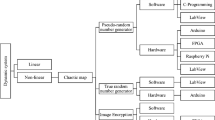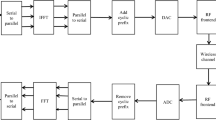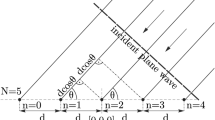Abstract
Frequency-modulated differential chaos shift keying (FM-DCSK) is essentially a technique that combines modulation with a spread-spectrum property for communications. It is also an effective technique similar to recent multiantenna methodologies that can make use of multipath effects, thereby achieving an excellent anti-multipath fading capability. Through analysis and simulation, this paper reports some essential characteristics and advantages in the system performance of the newly proposed M-ary FM-DCSK technology. The basic design of the M-ary FM-DCSK-based chaotic spread-spectrum communication system and a comparison with its conventional equivalent are presented. It is shown that the former is not only robust in multipath fading environments and simple in implementation, but also flexible in adjusting system parameters and trading-off several effects among bandwidth efficiency, energy efficiency, data rate, and error performance. It is demonstrated that the FM-DCSK technique is promising for the next generation of wireless communication systems as an excellent modulation and spread-spectrum scheme candidate.
Similar content being viewed by others
Author information
Authors and Affiliations
Corresponding authors
Rights and permissions
About this article
Cite this article
Ye, L., Chen, G. & Wang, L. Essence and Advantages of FM-DCSK Versus Conventional Spread-Spectrum Communication Methods. Circuits Syst Signal Process 24, 657–673 (2005). https://doi.org/10.1007/s00034-005-2413-8
Received:
Issue Date:
DOI: https://doi.org/10.1007/s00034-005-2413-8




